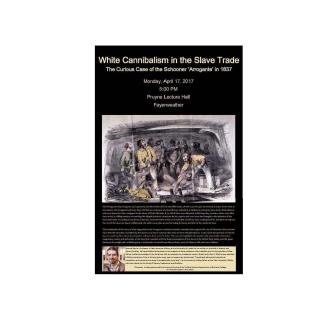Events & Calendars "White Cannibalism in the Slave Trade: The Curious Case of the Schooner 'Arrogante' in 1837"
Skip to Main ContentThe Portuguese ship Arrogante was captured in late November 1837 by the HMS Snake, off the coast of Cape San Antonio in Cuba. At the time of her capture, the Arrogante had more than 330 Africans on board, who had all been embarked at Gallinas by notorious slave dealer Pedro Blanco, and were bound to Cuba, consigned to the house of Pedro Martinez & Co. All of them were liberated in Montego Bay, Jamaica, where soon after their arrival, a chilling mystery surrounding the alleged practices carried out by the captain and crew were also brought to the attention of the local authorities. According to numerous witnesses, some members of the crew had killed an African man, cooked his flesh and then served it to the rest of the slaves on board. Additionally, the sailors were accused of eating the heart and liver of the murdered man.
The examination of the story of what happened on the Arrogante constitutes another example that supports the case of historians who currently claim that the atrocities committed by the slavers were more common than what we have thought thus far. It also raises the question of why the slavers would sacrifice those whom they hoped to sell upon arrival in Cuba. This case also highlights the questionable impartiality of Jamaican magistrates, courts and authorities at a time that coincided with the final emancipation of the slaves in the British West Indies The paper discusses the weight and credibility given to testimonies received from African slaves, most of whom, in this case, were children.
Manuel Barcia, professor of Latin American History at the University of Leeds, will speak. He is a scholar in the field of Atlantic and slavery studies. He has written extensively on the subjects of slave resistance, slave rebellion and the transfers of West African warfare knowledge to the Americas, with an emphasis on 19th-century Brazil and Cuba. He has written op-ed articles for Al Jazeera English, The Independent, The Washington Spectator and The Huffington Post, among others. He is also an editor of Atlantic Studies: Global Currents (Routledge), a journal of Atlantic history and cultural studies. In 2014 he was awarded a Philip Leverhulme Prize in History, given every year to researchers whose work "has already attracted international recognition and whose future career is exceptionally promising." He is currently a visiting fellow at Yale University's Gilder Lehrman Center for the Study of Slavery, Resistance and Abolition.
For more information, contact Manuela Picq at mpicq@amherst.edu.
This event is sponsored by the Lamont Fund and the Department of Political Science at Amherst College. It is free and open to the public.
Contact Info
 @amherst.edu
@amherst.edu
